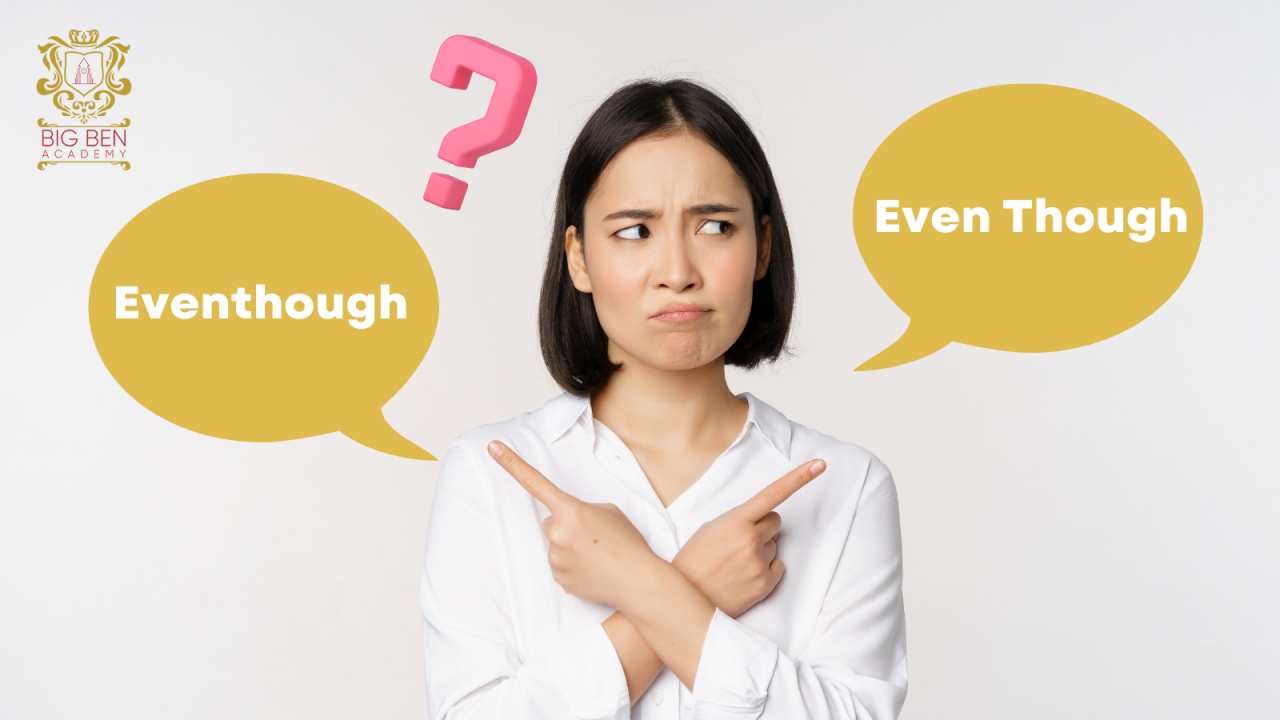
“Eventhough or Even Though” which is correct ?
The phrases “eventhough” and “even though” both are aimed at expressing a contrast or a surprising condition in relation to another statement. They are used to introduce a situation that does not prevent the main statement from being true.
For beginners, the usage of "even though" or "eventhough" in English could be confusing.
Table of Contents
- Even Though
- Right Usage of "Even Though"
- Examples of "Even Though" Sentences
- Synonyms of "Even Though"
- Eventhough
- Why "Eventhough" Is Incorrect?
- Differences between "Even Though" and "Eventhough
- Conclusion
- Frequently Asked Questions (FAQs)

Even Though
"Even though" is a conjunction that introduces a contrast or contradiction. It is similar to "despite the fact that" or "although." It presents a fact that seems to challenge a statement but actually emphasizes it.
Right Usage of "Even Though"
- Even though he was tired, he stayed up late to finish his work. Explanation: The phrase "even though" underscores the unexpected decision to continue working despite being tired.
- Even though she had studied hard, she did not do well on the test. Explanation: Studying with the expectation of performing well contrasts with disappointing results.
It's important to remember that "even though" always leads to a subordinate clause. This meaning it can't stand on its own. It requires a main clause to complete the sentence.
Examples of "Even Though" Sentences
- Even though it was cold outside, she went for a jog in the park.
- He managed to crack a joke, even though he was feeling nervous.
- Even though the odds were against her, she won the chess tournament.
- They enjoyed the concert, even though they were sitting at the back.
- Even though he's allergic to cats, he adopted one from the shelter.
- She completed the marathon, even though she had a sprained ankle.
- They remained friends, even though they had a big argument.
- He read the book in one night, even though it was over 500 pages.
- Even though the team was losing, their fans continued to cheer loudly.
- She always wears bright colors, even though her favorite color is black.
Synonyms of "Even Though"
- Although
- Despite the fact that
- Though
- Whereas
- Regardless
- However
- Nevertheless
- In spite of that
- Even if
- While
Eventhoug
"Eventhough" is not a valid word in English, despite being frequently used. The correct term is "even though".
The confusion might come from merged words like "nevertheless" and "although". This mistake also happens a lot because spoken English is so fluid. Where words blend together, leading to misconceptions in their written form.
"Even though" should always be two separate words. Using "eventhough" is a common mistake and can affect you clarity in communication.
Why "Eventhough" Is Incorrect?
This is because "eventhough" is not a recognized word in English dictionaries. The mistake often occurs when merging the two separate words "even" and "though."
"Even" is an adverb that adds emphasis, while "though" is a conjunction that links parts of a sentence. Combining them into "eventhough" causes grammatical errors.
It"s important to use them as separate words to maintain correctness in English.
Differences between "Even Though" and "Eventhough
| Term | Spelling | Usage | Meaning |
|---|---|---|---|
| Even Though | Two separate words | Common in both formal and informal English | Used to introduce a contrast |
| Eventhough | Mixed up wrongly into one | Mostly seen in informal, non-standard English | A wrong use of the phrase "even though" |
Conclusion
The correct phrase is "even though”, while "eventhough" is not recognized as a standard word in English. Therefore, always use "even though" when you want to express something contrasting or surprising. For example, "Even though it rained, we still went out.
"Even though" should always be written as two separate words; combining them into "eventhough" is incorrect in English.
Next time you think of writing "eventhough", remember that "even though" is the correct form. This small change can make your work better, and believable.
To further improve your English writing skills, try joining the Big Ben Academy. Our programs are meant to help you improve your English language skills by giving you all the advice and support you need. Sign up now Big Ben Academy!
Frequently Asked Questions (FAQs)
- Is "even though" a correct word?
- How do you use "eventhough" in a sentence?
- Is there a word "even though"?
- Is it "even though" or "even if"?
Yes,"even though" is correct in English. Always remember not to misuse "Eventhough" in your writing, which does not correct in English.
First, always remember to separate "even" and "though" while using, because "eventhough" is incorrect in English. You can use "even though" in a sentence like: "Even though the cake didn't look perfect, it tasted delicious."
Yes, "Even though" does exist, and is not a single word but a two-word phrase used in English.
Both "even though" and "even if" are correct, just in different uses.
"Even though" is used when something happens despite another thing that has already occurred or is a known fact. For example: Even though he misses the train, he still finds a way to go to school.
"Even if" is used to speculate about potential situations that might happen in the future. For example, "Even if you take a train, you'll still be late to school."
More related articles
Pricy or Pricey? The Correct and Common Usage in 2023
Practise or Practice: English Common Mistake
“Advice or Advise” How should I use and differentiate each?
Women or Woman? How to Use Each Correctly
Join Big Ben Academy
Speak English Confidently, Write English Fluently



